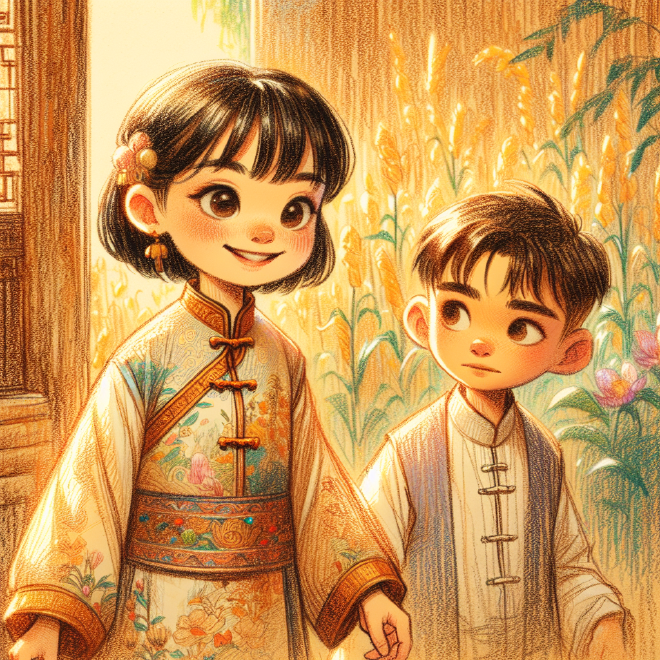失而复得的幸运符

Table of Contents
Audio #
汉字 #
丽丽很高兴,因为她买了一套新的茶具。她想和小明一起用新的茶具泡茶。丽丽给小明打电话说:“小明,你好! 我今天买了一套新的茶具。你想来我家做客,一起喝茶吗?我们可以一起学习中国的茶文化。”
小明也很高兴,他说:“太好了!我一直想学习中国的茶文化。我今天下午有时间,我可以去你家。”
下午,小明来到了丽丽的家。丽丽已经准备好了茶和一些小点心。她给小明介绍中国的茶文化,比如不同的茶叶,泡茶的方法等等。他们先用热水洗了茶具,然后放了茶叶,倒了热水。茶的香味很快就飘了出来。
小明说:“哇,茶的味道真好!谢谢你,丽丽,让我学到了很多关于茶的知识。”
丽丽笑着说:“不用谢!我也很高兴能和你一起分享。以后我们还可以一起学习更多的中国文化。” 他们一边喝茶,一边聊天,度过了一个愉快的下午。
Pinyin #
Lìlì hěn gāoxìng, yīnwèi tā mǎile yī tào xīn de chájù. Tā xiǎng hé Xiǎomíng yīqǐ yòng xīn de chájù pào chá. Lìlì gěi Xiǎomíng dǎ diànhuà shuō: “Xiǎomíng, nǐ hǎo! Wǒ jīntiān mǎile yī tào xīn de chájù. Nǐ xiǎng lái wǒ jiā zuòkè, yīqǐ hē chá ma? Wǒmen kěyǐ yīqǐ xuéxí Zhōngguó de chá wénhuà.”
Xiǎomíng yě hěn gāoxìng, tā shuō: “Tài hǎole! Wǒ yīzhí xiǎng xuéxí Zhōngguó de chá wénhuà. Wǒ jīntiān xiàwǔ yǒu shíjiān, wǒ kěyǐ qù nǐ jiā.”
Xiàwǔ, Xiǎomíng láidào le Lìlì de jiā. Lìlì yǐjīng zhǔnbèi hǎo le chá hé yīxiē xiǎo diǎnxīn. Tā gěi Xiǎomíng jièshào Zhōngguó de chá wénhuà, bǐrú bùtóng de cháyè, pào chá de fāngfǎ děngděng. Tāmen xiān yòng rè shuǐ xǐ le chájù, ránhòu fàng le cháyè, dào le rè shuǐ. Chá de xiāngwèi hěn kuài jiù piāo le chūlái.
Xiǎomíng shuō: “Wa, chá de wèidào zhēn hǎo! Xièxiè nǐ, Lìlì, ràng wǒ xué dàole hěn duō guānyú chá de zhīshì.”
Lìlì xiàozhe shuō: “Bùyòng xiè! Wǒ yě hěn gāoxìng néng hé nǐ yīqǐ fēnxiǎng. Yǐhòu wǒmen hái kěyǐ yīqǐ xuéxí gèng duō de Zhōngguó wénhuà.” Tāmen yībiān hē chá, yībiān liáotiān, dùguò le yī gè yúkuài de xiàwǔ.
English Translation #
Lili was very happy because she bought a new tea set. She wanted to make tea with Xiaoming using the new tea set. Lili called Xiaoming and said, “Xiaoming, hello! I bought a new tea set today. Would you like to come to my house and have tea together? We can learn about Chinese tea culture together.”
Xiaoming was also very happy. He said, “Great! I’ve always wanted to learn about Chinese tea culture. I have time this afternoon, I can go to your house.”
In the afternoon, Xiaoming came to Lili’s house. Lili had already prepared tea and some snacks. She introduced Chinese tea culture to Xiaoming, such as different types of tea leaves, methods of making tea, and so on. They first washed the tea set with hot water, then put in the tea leaves and poured in hot water. The aroma of the tea quickly wafted out.
Xiaoming said, “Wow, the tea tastes really good! Thank you, Lili, for letting me learn so much about tea.”
Lili smiled and said, “You’re welcome! I’m also very happy to share with you. In the future, we can also learn more about Chinese culture together.” They drank tea and chatted, spending a pleasant afternoon.
Grammatical Points and Analysis #
Verb-Object Phrases: #
- 泡茶 (pào chá): make tea
- 打电话 (dǎ diànhuà): make a phone call
- 做客 (zuòkè): be a guest
- 学习文化 (xuéxí wénhuà): learn culture
- 准备茶 (zhǔnbèi chá): prepare tea
Resultative Complements: #
- 学到 (xué dào): learn/acquire (knowledge) - 到 indicates achieving the result of learning.
- 准备好 (zhǔnbèi hǎo): prepare (something) well - 好 indicates the action is completed successfully.
Time Words: #
- 今天 (jīntiān): today
- 下午 (xiàwǔ): afternoon
- 以后 (yǐhòu): in the future
Adverbs of Degree #
- 很 (hěn): very
- 太 (tài): too; extremely
- 一直 (yīzhí): always
- 快 (kuài): fast; quickly
Questions #
- 小明为什么很高兴去丽丽家做客? (Xiǎomíng wèishénme hěn gāoxìng qù Lìlì jiā zuòkè?) Why was Xiaoming happy to visit Lili’s house?
Click to show the answer
answer #
小明很高兴去丽丽家做客,因为他一直想学习中国的茶文化。(Xiǎomíng hěn gāoxìng qù Lìlì jiā zuòkè, yīnwèi tā yīzhí xiǎng xuéxí Zhōngguó de chá wénhuà.) Xiaoming was happy to visit Lili’s house because he had always wanted to learn about Chinese tea culture.
- 他们泡茶以后,小明说了什么? (Tāmen pào chá yǐhòu, Xiǎomíng shuōle shénme?) What did Xiaoming say after they made tea?
Click to show the answer
answer #
他们泡茶以后,小明说茶的味道真好,并感谢丽丽让他学到了很多关于茶的知识。(Tāmen pào chá yǐhòu, Xiǎomíng shuō chá de wèidào zhēn hǎo, bìng gǎnxiè Lìlì ràng tā xué dàole hěn duō guānyú chá de zhīshì.) After they made tea, Xiaoming said the tea tasted really good and thanked Lili for letting him learn a lot about tea.
Disclaimer: This story is purely fictional and generated by AI. Any similarities to real people, places, or events are purely coincidental.